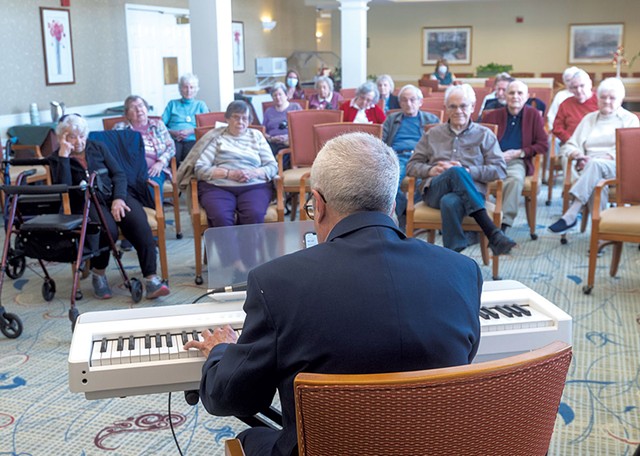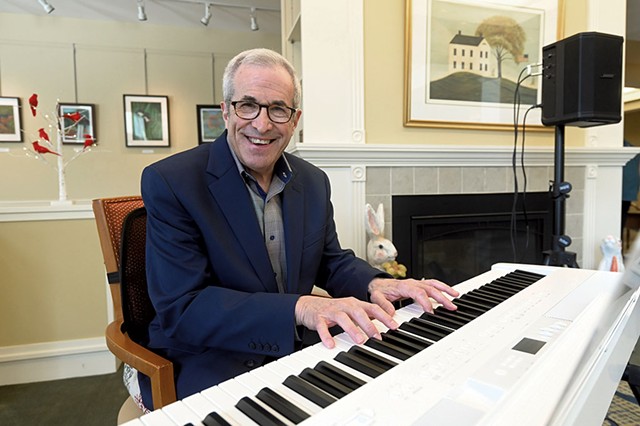
- Jeb Wallace-Brodeur
- Dan Alan Levine performing at Westview Meadows in Montpelier
On his path to Broadway, pianist, composer and arranger Dan Alan Levine made a series of bold career moves.
As a college student at the Manhattan School of Music in the early 1970s, he cut classes and snuck onto "The Dick Cavett Show" set by pretending to be in the house band — and eventually got one of his original songs featured on the program. He created music for classic TV game shows "What's My Line?" and "I've Got a Secret." In the Washington, D.C., area, he wrote and produced commercial jingles with such up-and-coming vocal talents as Pat Benatar and Barry Manilow. Returning to his native New York in the early 1990s, Levine reached a professional peak by composing the original, Tony Award-nominated score for a Broadway production of Anna Karenina, adapted from the Leo Tolstoy novel.
But Levine's boldest — or, at least, most unconventional — career move was still to come: He relocated to Vermont.
That's relocated, not retired. The distinction is important in light of Levine's latest gig: playing piano at senior-living communities around the state. While, at 74, he may fit the retiree demographic, his career hasn't lost a beat since he ventured north with his family in 1998.
He brought with him the voice-over training company, Such a Voice, that he founded in 1993. The company is headquartered in South Burlington and employs roughly 100 people in the U.S. and Canada. Levine has also been prolific musically, producing the cast album for the off-Broadway show Thunder Knocking on the Door; arranging, orchestrating, producing and performing on Leslie Uggams' album On My Way to You; orchestrating and producing the Anna Karenina cast album; and orchestrating the Anna Karenina score for a Chicago production and three tours in Japan.
Against such accomplishments, Levine's senior center performances may not pop on today's music scene. But they rekindle his passion for playing — and for reaching an audience while "making a difference," he said. His current bookings include 20 facilities throughout Vermont and into Maine.
According to Jennifer Hyman, engagement associate at the Residence at Shelburne Bay, where Levine played recently, his concerts complement the residents' other activities, which might include meditative tai chi, ceramics workshops and outings to Denny's diner.
"I think live music makes people happy," Hyman said in a phone interview. "It improves their moods. It brings back all their happy memories, and I think that's the key."
Levine's concert clearly supported the Residence's goal of fostering social connections. He played to a crowd of more than 30 people at one point. They listened attentively to his between-song patter and smiled and swayed at such familiar tunes as Burt Bacharach's "Walk on By."
Hyman noted that Levine's music sometimes moves audiences literally. "It's amazing to see people who may not have any language [capacity] come out and start toe-tapping or humming or just all of a sudden involuntarily singing the words," she said.
Levine has witnessed the phenomenon from his keyboard vantage: "I jog their memories. I bring them back," he said. "I can see it in their eyes."
What Levine sees in his audience, in fact, aligns with research on the benefits of music, especially familiar music, for aging individuals. Hearing and singing along with known songs can help restore a person's sense of self and identity — a particular challenge for people with dementia or Alzheimer's disease. Shared musical experiences can also strengthen connections with family members, caregivers and community neighbors — palliating the social isolation that can be part of geriatric life.
Beyond his impressive piano playing, Levine wins over his audiences by taking requests — and being able to play, by ear, nearly any tune so long as he has heard it before. The Shelburne crowd called for some chestnuts — plaintive show tunes "Sunrise, Sunset" from Fiddler on the Roof (RIP, Topol) and "Don't Cry for Me, Argentina" from Evita, as well as sprightly standards "On the Sunny Side of the Street" and "Ain't She Sweet," among others.
These numbers didn't seem to challenge Levine's own memory, but he acknowledged that he frequently finds himself performing songs he has never played before.
"How do I know these songs?" he said. "I don't. They're in my head if I've heard them. If I know the melody, I know the harmonies." While playing piano, Levine "hears" other instruments that could accompany a piece and works those parts into his performance. "I'm not what you call a saloon pianist," he said. "When I play by ear, in a way I'm composing. I'm arranging on the spot."
What audiences hear is not "fast, improvisational jazz runs," Levine said, but "lush voicings and chord progressions" — a fullness that enchants. One piano-playing fan, Shelburne Bay resident Phyllis Brooks, shared her impressions of Levine's performances: "We all enjoy his professionalism, his playing, and it's just thrilling," she said by phone. "I always sit in the front row so I can watch him moving fingers up and down the keys. You can just tell by his face, by the way he plays, by the way he moves his body that he gets right into it emotionally. He really enjoys what he's doing."
She added that Levine's ability to take requests, and to pinpoint the music's artist and era, is especially welcome.

- Jeb Wallace-Brodeur
- Dan Alan Levine
The senior circuit, corporate events and parties keep Levine on his toes, but he has also leaped into new musical territory. Driven by a self-described ambition "as high as you can get," he began chasing a goal of releasing a hit record. While his musical heart beats show tunes and classic pop, with the late hitmaker Bacharach being his strongest influence — Levine admires "his sense of the unexpected" — he thought his musical tastes could add something special to an oft-disparaged genre: smooth jazz.
"It's the perfect kind of music to express myself in my own way," Levine said.
In January 2021, he began working on an album titled Over the Moon. He collaborated with local musician and lawyer Andrew Manitsky, keyboardist in the band B-Town and the president of the Vermont Bar Association. Manitsky, admittedly not a smooth-jazz fan, sent Levine synthesized drum tracks around which Levine composed piano melodies. On other occasions, Levine would send Manitsky piano tracks from which to build a rhythmic foundation.
"He really embraces the element of surprise in music," Manitsky said by phone of his collaborator, adding that Levine's choices are familiar, yet not overly so. "He makes choices that never would have occurred to me. That's fun."
Levine also reached for the stars, starting with West Coast saxophonist Jeanette Harris, a sensation on the R&B and smooth-jazz scenes. As Levine and Harris agree, the saxophone is the signature sound of smooth jazz. But Harris also heard something unique in Levine's songs — a style that brought her back to her work in classical music, big band and traditional jazz.
"They all have their own vibe," she said of the songs by phone. She noted that some are "cool," some are "sexy" and others, like the track "Our Kind of Love," have "something that makes you smile." That variety, Harris added, is a strength of Over the Moon.
"I love that the smooth-jazz family and folks are accepting and appreciating his music," she said. "Sometimes we need something different and something new."
On Harris' recommendation, Levine sought out Alabama-based flutist Kim Scott, whose single "Emerge," from the 2019 Innervision Records album Free to Be, reached the No. 1 spot on the Billboard smooth jazz chart. Scott knew that Levine was searching for "a really nice tone and clear technique." She was "quite shocked," she said by phone, when she heard his tracks, which came across "more like classic jazz" than smooth jazz — "a pure, energetic, uplifting tone and sound and melody."
Scott's deep background in classical music also tuned her in to what she heard as classical rhythms and techniques, a respect for "form," and "strategic melodic choices," she said. She noted that her own style often blends classical and jazz in this way.
"My style and Dan's style complement each other," she said.
Thanks to this collaboration, Levine achieved his lofty goal. The first three singles released from Over the Moon — "Cozumel," "Our Kind of Love" and the title track — all hit the top spot on the smoothjazz.com charts, the flagship site for the genre. The full album dropped this January. According to Levine, album tracks are now in rotation on nearly 200 radio stations around the country. He's in the process of putting together a band, and a national and international tour may follow.
For now, Levine's senior community tour plays on. He recently played live "Our Kind of Love" and "Over the Moon," with recorded accompanying tracks from the album, and reported that they went over well. But he's also thinking bigger. He's working on a subscription-based platform to live stream and record his performances for multiple senior centers simultaneously. The venture, which he's calling Applause, could be ready to launch within months, he said.
In other words, while Levine may look at home in the serene, pastel-accented community room of a senior-living facility, the player with seven keyboards in his house, including one in his bedroom, is unlikely to take a break anytime soon. Levine likened his piano playing to breathing, drinking water and talking. He even plays music in his sleep.
"My dreams begin with musical overtures," he said.











Comments
Comments are closed.
From 2014-2020, Seven Days allowed readers to comment on all stories posted on our website. While we've appreciated the suggestions and insights, right now Seven Days is prioritizing our core mission — producing high-quality, responsible local journalism — over moderating online debates between readers.
To criticize, correct or praise our reporting, please send us a letter to the editor or send us a tip. We’ll check it out and report the results.
Online comments may return when we have better tech tools for managing them. Thanks for reading.